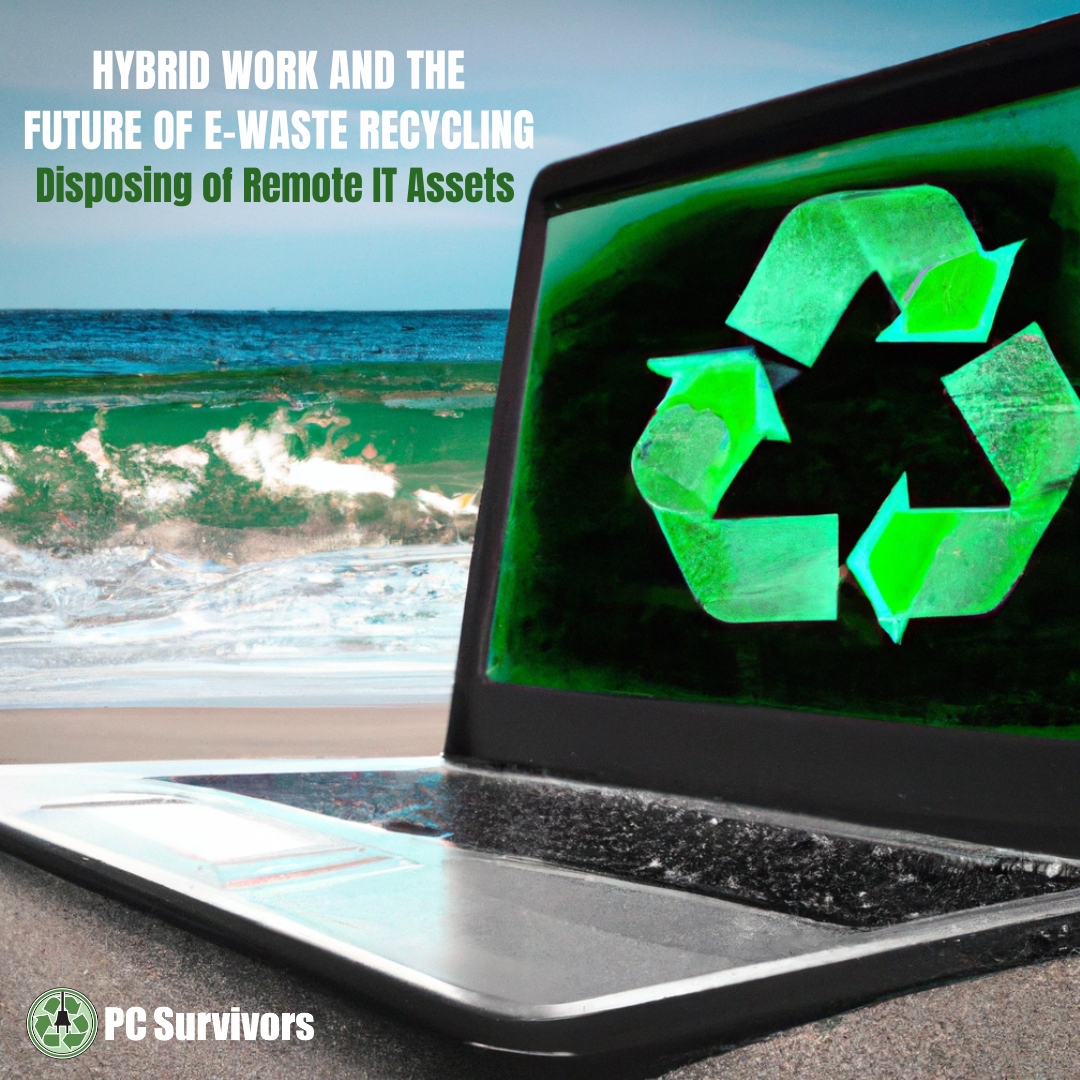Hybrid Work and the Future of E-Waste Recycling: Disposing of Remote IT Assets
As the world transitions to a new era of work, the hybrid model of combining remote and in-office teams has emerged as a popular choice for many organizations. This shift has brought about significant changes in how we use and manage our electronic devices, resulting in a pressing need for new e-waste recycling strategies, particularly for remote IT assets. In this article, we will explore the future of IT asset disposal (ITAD) in the context of hybrid work, the challenges associated with it and potential solutions for your business.

The Rise of Hybrid Work and Its Impact
Though the remote work model was already on the rise, the pandemic dramatically accelerated the adoption of this practice for companies across diverse industries and of all sizes. In fact, approximately one third of businesses the United State increased teleworking in 2021, according to a U.S. Bureau of Labor Statistics report.
While this model offers numerous benefits in terms of flexibility, productivity and cost savings, it also presents unique challenges related to the disposal of electronic waste. With employees working remotely, the use of personal computers, laptops and other electronic devices has surged, resulting in an increased volume of e-waste generated outside of traditional office spaces.
Challenges in E-Waste Recycling for Remote IT Assets
- Data Security and Regulatory Compliance: Proper data sanitization and destruction procedures are crucial to protect sensitive information and uphold applicable regulations. Remote work often involves the use of personal devices and home networks, raising concerns about data security during the disposal process.
- Logistics: Unlike a shared office space where e-waste collection and recycling processes can be organized on-site, remote work introduces the need for decentralized collection and logistics systems. Efficient mechanisms to collect and transport electronic devices from employees’ homes to recycling facilities must be established.
- Awareness and Education: Your remote workers may not know of the security risks or negative environmental impact that improper e-waste disposal can create. Employees should be educated about your company’s e-waste recycling policies so that they can follow them accordingly.
The Future of E-Waste Recycling for Remote IT Assets
Several approaches and strategies to address the challenges associated with e-waste disposal in the hybrid work era are emerging:
- Collaboration with E-Waste Recycling Companies: Partner with an e-waste recycling company that specializes in handling remote IT assets. Together, you can coordinate secure and responsible collection, transportation and recycling of remote electronic devices — ensuring compliance with regulations and minimal environmental impact. Depending on the location of your workforce, your remote IT asset disposal plan can include local pick-ups or utilization of shipping providers.
- IT Asset Tracking – Keeping detailed records of the equipment your team uses is a great way to manage your data risk exposure and environmental footprint. If you choose to have your items transported by a carrier like FedEx, take advantage of their tracking service to maintain a complete chain of possession for your records. From there, the professional electronics recycling company that processes it can provide a final certificate of destruction.
- Remote Data Erasure: Development of reliable and convenient data sanitization methods for remote IT assets are becoming more viable. In the coming years, you may be able to have employees run data wiping software and even perform basic data destruction on their own equipment before it is sent off to be fully wiped and professionally recycled.
- Employee Education and Engagement: You can promote security and sustainability at your organization by engaging your remote workforce and educating them on the importance of responsible e-waste disposal. Providing guidelines, resources and incentives for employees to recycle their IT assets can create a culture of shared responsibility and foster company pride.
PC Survivors: Pioneers in Responsible Remote IT Asset Disposal and E-Waste Recycling
As organizations navigate this new work model, there is a critical need for responsible disposal of remote IT assets and effective e-waste recycling strategies. At PC Survivors, we are fully aware of the challenges surrounding remote IT assets in terms of data security, recycling, logistics, employee education and more. We’ll work with you to create the ideal e-waste management solution for your specific application. We take pride in leading the way toward a secure and sustainable future.
As proud members of NAID (The National Association for Information Destruction) as well as holders of RIOS and R2v3 certificates for sustainable recycling, you can count on us to provide sound advice and practical solutions reguarding your remote IT assets. Rest assured, all of our techniques meet or exceed the requirements HIPAA, Gramm Leach Bliley, GDPR and other compliance standards.







